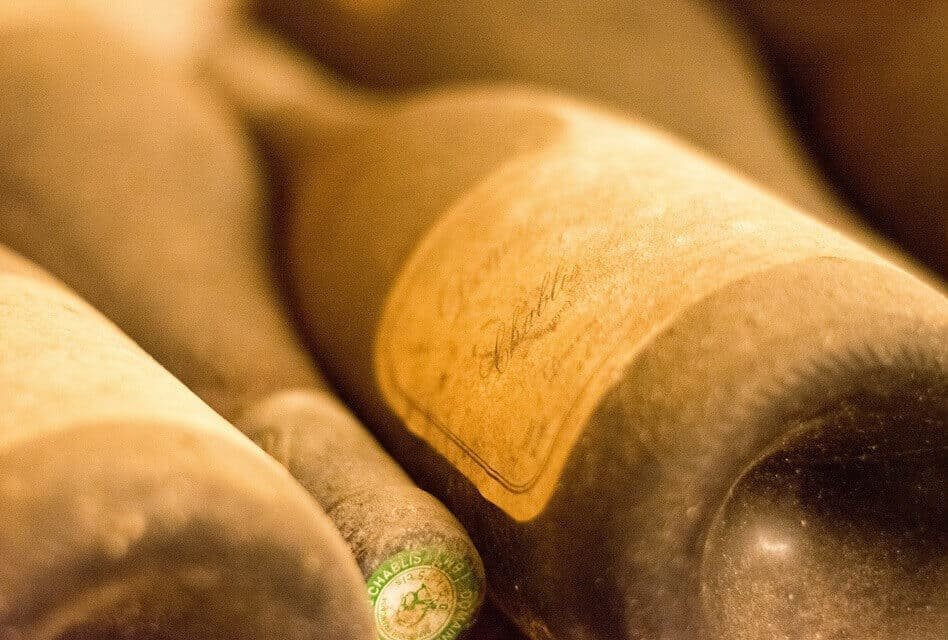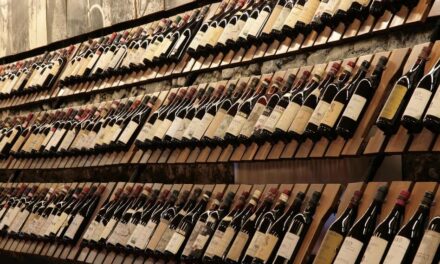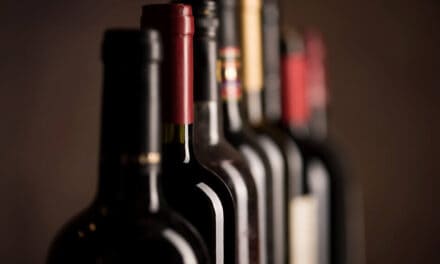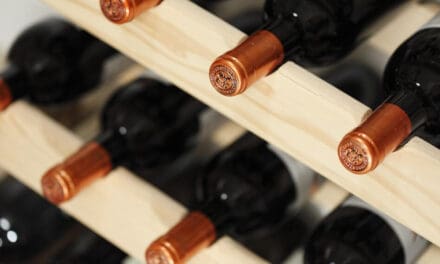Wine quality depends on so many factors that you could spend a lifetime studying all of them. But even wine newbies are familiar with one of them: age. It is common knowledge that a dusty bottle spent decades in a dark cellar is better than one coming right off the store shelf. Is that a fact, though? Is it true that bottles of wine get better with age?
Wine gets better with age because chemical reactions slowly change its flavor profile. Its tannins become less aggressive, resulting in a smoother and less bitter experience. Also, the wine’s primary flavors get less dominant, and entirely new aromas are created. In summary, the wine becomes more elegant and thus more enjoyable.
Not every wine gets better with age, though. It has to fulfill specific requirements, and it also needs particular storage conditions to improve over time. In the following paragraphs, we will discuss the details.
HOW DOES WINE IMPROVE WITH AGE?
During the aging process, the wine’s aromatic components change very slowly. The most significant change happens concerning acids. They combine with alcohol and form molecules called esters. While the initial sour notes become less dominant, these esters introduce new aromas. Typical aromas resulting from aging are smoky aromas such as tobacco, earthy notes, and subtly sweet flavors such as honey or caramel.
Another crucial aspect is the transformation of tannins. In young wines, they are strong and aggressive and create an intense mouth-drying sensation. But during the aging process, they connect and form bigger and bigger molecules. And eventually, these molecules become too heavy, suspend from the wine, and sink to the bottom of the bottle. As a result of the tannins’ fallout, the wine becomes less bitter and gets a smoother and more elegant texture.
The visible (and tasteable) fallouts are called sediments, and they are one reason for decanting old wines.
DO ALL WINES GET BETTER WITH AGE?
Only wines with the right combination of characteristics get better with age. In general, well-balanced wines with high acidity, sugar, and tannin levels are perfect for aging. Alcohol is also an essential factor.
Let us look at these factors in more detail.
Acidity Levels
Acidity is an important preservative agent. It keeps wine fresh and creates aromas such as green fruit and citrus notes.
For the aging process, acidity is crucial because it ensures that the wine does not go off over time. Thus, high acidity levels help wine get better with age. Although acidity levels stay roughly the same during this process, their structure changes, resulting in new aromas.
Tannin Levels
Tannins belong to the group of polyphenols and naturally occur in wine grapes. Some vintners also add tannins artificially by letting their wines mature in oak barrels. During this process, the oak wood imparts its tannins into the wine.
Just like acidity, tannins have preserving capabilities. The higher the tannin levels, the longer a wine keeps. Consequently, tannins also increase the chance that wine improves over time without going off.
Besides being a conservation agent, tannins determine the perception of wine. When drinking a high-tannin wine, you can sense an astringent, mouth-drying experience. In young wines, that might come across as very dominant and aggressive.
While aging, that sensation changes. The tannins become less aggressive, or in other words, they become smoother. At the same time, other aromas become more perceivable. As a result, the wine becomes more complex.
Sugar Levels
Residual sugar determines how sweet a wine tastes. Its sugar level is primarily determined by the grape variety. But fermentation plays a role, too: The longer the wine ferments, the more sugar turns into alcohol.
During the aging process, this process continues at a very low pace. The yeast in the wine transforms the remaining sugar into more alcohol. Logically that cannot happen if a wine is low in sugar. Thus, these wines have a limited potential to get better with age.
Alcohol Levels
The alcohol level is a direct result of the fermentation process. The longer vintners let the wine ferment, the more sugar will turn into alcohol, and the stronger the wine will be.
Alcohol stabilizes wine and thus prevents rapid changes in aromas. Therefore, wines with high alcohol levels typically age much slower than low-alcohol wines.
Fortified wines are an exception, though. Although they have very high alcohol levels, many of them are age-worthy. The reason is that alcohol comes from artificial fortification. There is still plenty of sugar left in the wine that encourages aging.
WILL CHEAP WINE GET BETTER WITH AGE?
Price does not determine whether wine can get better with age or not. It can be an indicator, though. Well-crafted wines result from plenty of winemaking experience, healthy grapes, and careful (and often manual) work. Typically, these wines come with a higher price tag. But some cheaper wines can be age-worthy nevertheless.
WHICH WINE IS GOOD FOR AGING?
Finding a wine that improves with age can be tricky. Before tasting it, you might not know its acidity, sugar, or tannin levels. Besides, there are so many factors to consider. Here are some hints to find out if a wine has aging potential:
- Red wines usually have a higher aging potential than whites. Nevertheless, you can find age-worthy wines on both sides of the spectrum.
- Wines from cooler regions in the Old World tend to have better aging potential than wines from warmer areas in the New World. The reason is acidity: When grown in hot climates, the grapes lose their acidity quickly. The resulting wine often lacks balance in this case, stripping away its ability to age well.
- Even in cool regions, heat waves can reduce the aging potential of vintage wines. So it makes sense to look up the vintage.
- Only well-made wines can improve with age. In contrast, mass-produced styles might not match the requirements. Checking the winemakers’ history can hint at their past performance and indicate whether their latest wines are age-worthy or not.
- Alcohol levels are printed on the bottle label. So they can help you identify an age-worthy wine before buying it. With less than 13.5% alcohol, wines tend to age better than stronger wines. As mentioned, fortified wines such as Port, Madeira, or Sherry can be exceptions.
Does Red Wine Improve with Age?
Many types of red wine get better with age. Some of them need up to 20 years to realize their potential.
The best red wines for aging are the following:
- Cabernet Sauvignon
- Malbec
- Merlot
- Nebbiolo
- Pinot Noir (especially Red Burgundy wines)
- Red Bordeaux
- Sangiovese
- Syrah / Shiraz
- Tempranillo
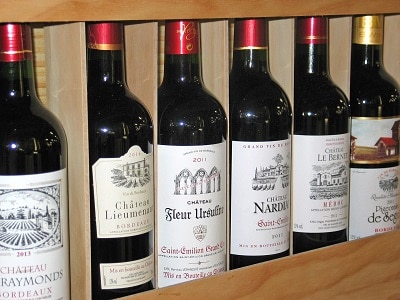
Bottles of Red Bordeaux Wines
Does White Wine Improve with Age?
White wine can get better with age, too. But there are fewer age-worthy white wines than reds. And typically, they need less time to arrive at the peak of their potential.
The following white wines tend to age well:
- Chardonnay
- Muscadet
- Pinot Gris
- Sauvignon Blanc
- Semillion
- Trebbiano
- White Rioja
- Viognier
Does Rosé Wine Get Better with Age?
Rosé wines do not improve with age. They are meant to be drunk while young and crisp, so storing them doesn’t make them better.
There are only very few exceptions. For instance, high-quality rosé wines from the Bandol region in Southeast France can be aged for 3 to 5 years maximum. The changes might not be perceivable for non-experts, though.
Does Port Wine Get Better with Age?
In general, Port wine does not get better with age. The vast majority of these fortified wines have already aged for years or even decades in barrels before bottling. When being sold, they have reached the peak of their potential and will not improve further.
There is one exception, though: Vintage Port. These high-quality wines are made from only the best grapes. They have an excellent structure but spend not more than two years in casks. When bottled, they are far away from reaching their full potential. Thus, Vintage Port will get better with age. Its tannins will slowly soften as you store it, and the wine will develop more delicate aromas. This process can go on for decades.
Does Sparkling Wine Get Better with Age?
The aging potential of most sparkling wines is limited. Non-vintage styles will not get perceivably better with age. You should finish these bottles within three years of buying them.
In contrast, vintage sparkling wines get better with age. The same is true for some Cuvée styles. Especially those made by following the Traditional Method, such as Champagne or Cava, improve over time. They will improve over time for 5 to 10 years.
Some Champagne vintners purposefully produce their wines for aging. The very best of their vintage wines get better over while aging for up to 20 years.
Interestingly, Vintage sparklers in Magnum bottles of 1.5 liters (or even bigger bottles) tend to have better aging potential. The reason is that more yeast is left in the bottle encouraging the production of carbon dioxide. As a result, the wine will not lose its fizz, even if you keep it in your cellar for decades.
HOW TO AGE WINE PROPERLY
If you want to age wines, you need to provide the proper storage conditions:
- Most important, provide a constant room temperature. It should never be higher than 68°F (20°C). Lower temperatures are even better.
- Shield your wines from sunlight. A room without windows is the best option.
- Don’t expose your bottles to aggressive smells from heating oil, cleaning agents, and wall paint. Otherwise, their odors might invade the bottles via the cork.
- Vibration can also harm the aging process. Thus, keep your wines away from air conditioning devices, washing machines, and (regular) refrigerators.
In any case, a wine cooler provides the best conditions and maximizes the chances that your wine gets better with age.
FINAL WORDS
Patience is not every wine lover’s strength. But if you want to get the best out of your wine, it is really worth waiting. Drinking a wine that had years or even decades to improve is like tasting history. So give your wines a chance to get better with age.

